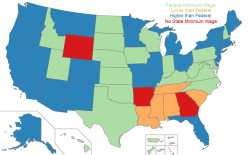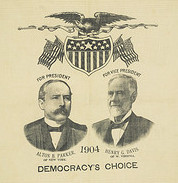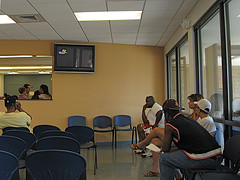Blog Archives
Some Tories are complaining that Cameron is rigging the EU referendum.
Though maybe it wasn’t actually a cigarette in Obama’s hand, I agree with Philip Bump that we shouldn’t really care if it was.
John Kasich has apparently decided to go Full Huntsman, breaking several of Dan McLaughlin’s rules (3,50,52, and 65) and removing himself from my list of credible candidates.
Amber Frost reports back (sort of) from the Commie Con, a gathering of leftists known as the Left Forum.
Erica Grieder expresses sympathy for the social conservatives in Texas, who had a disappointing legislative session.
The networks made fools of themselves ignoring Ron Paul in 2012. Is Fox continuing the tradition in 2016 with Rand? I find their explanation less than satisfactory.
The Republicans should use this data to keep Donald Trump out of the debates.
Among the more surprising about-faces on the Confederate Flag: The Southern Avenger.
I don’t think the use of the Confederate Flag in southern Italy and Donetsk changes the context here in the US, but it is interesting.
I enjoyed Lion’s account of his trip to Reno.
That fathers on television are portrayed as bumbling idiots is not new to Hit Coffee readers, but the thing about working class fathers being portrayed more generously than middle class ones is interesting.h
Amazon is changing how ebook authors are paid under Kindle Unlimited, from “must have read 10%” to looking at page count. Hit Coffee patron Abel passes along this defense of the plan. I’m wondering – and kinda hoping – that writers try to game the system by adding art to beef up their page count. More books should contain art. McMegan also comments.
Birds are scary, and smart.
Jonathan V Last argues the greatness of Jurassic Park. I watched it again earlier this year, and was really impressed by the movie’s pacing.
Will virtual reality help college football players practice more safely?
Saudi Arabia is claiming success in killing US shale drilling, but production in the US is rising as the drilling costs are falling.
Damon Linker looks at Vox’s terrible track record on ISIS, and touches on just about every problem I’ve had with the site since its inception. It has a roster whose writers I enjoy, and somehow made me enjoy each of them less together than I enjoyed them separately. Also, here’s the voxiest headline ever written.
“Waitaminute. What happened to #Dontbackdown! Free speech is at stake here!” –Stillwater
 A small bit of backstory. Over There, we had a series of conversations about the Charlie Hebdo massacre and the free speech implications. There were two lines of thought. The first was that we should rally behind Charlie Hebdo and the notion of free speech. We’ll call this TFS (Team Free Speech), and consisted of James Hanley, Mr Blue, Oscar Gordon, myself, and others. The other side of the conversation consisted of people who believed that the murders were wrong and claimed varying degrees of commitment to free speech, but believed in the importance of expressing disagreement with Hebdo’s speech, defending those who express disagreement, and often against exercising one’s freedom of speech in support of such blasphemy in general. We’ll call this TAB (Team Against Blasphemy [2]) included Stillwater (who doesn’t participate here), Chris (who does), and others.
A small bit of backstory. Over There, we had a series of conversations about the Charlie Hebdo massacre and the free speech implications. There were two lines of thought. The first was that we should rally behind Charlie Hebdo and the notion of free speech. We’ll call this TFS (Team Free Speech), and consisted of James Hanley, Mr Blue, Oscar Gordon, myself, and others. The other side of the conversation consisted of people who believed that the murders were wrong and claimed varying degrees of commitment to free speech, but believed in the importance of expressing disagreement with Hebdo’s speech, defending those who express disagreement, and often against exercising one’s freedom of speech in support of such blasphemy in general. We’ll call this TAB (Team Against Blasphemy [2]) included Stillwater (who doesn’t participate here), Chris (who does), and others.
The conversation created a lot of bad blood, that still gets spilled in ostensibly unrelated threads. Stillwater’s above comment was a reference to it.
I’m not sure whether Stillwater was trying to point out an inconsistency within TFS, or mocking them for being indifferent to offensiveness, or both. It might have been both, the first for those who want the flag to come down and the second for those who don’t. I can’t really speak to the second, but as a TFSer who wants to see the flag come down, it does present an interesting question: Do people who would defend Charlie Hebdo’s offensive cartoons similarly defend the Confederate flag?
The issue, for me, is that context matters a great deal. While some TFSers might object to any criticism of any speech ever, or at least object to criticism of any speech they disagree with on the basis of “Free Speech”, that wasn’t really my position or how I read the position of the others. Most of the time, the justification (or lack thereof) in criticizing Hebdo depends almost entirely on whether the criticisms are correct. Which is to say “Are these cartoons offensive or should we defer to those who believe they are?” is the primary question of relevance.
Which changes almost immediately, though, when violent terrorism occurs. As soon as that happens, the context changes. Not permanently, and pretty immediately. At that point, I could care less if the cartoon was disrespectful. It’s beside the point. Conversations about whether or not we should say offensive things become out of place. In the context of blood a murder having just occurred, it’s really the murder that’s the important thing and any mention of objecting to the cartoons is an afterthought. I mean say it, or don’t, but if that’s your central point, I’m not particularly interested in your point of view.
Time has passed, though, and the context has changed. So if you want to talk about whether we should or shouldn’t make fun of religion in a way that makes people mad, we can definitely have that conversation. I find many of Hebdo cartoons to be rather defensible, but I think a lot of criticisms of Islam – including cartoons – are often things that are better left unsaid.
What about the Confederate Flag? This is where context matters. And I don’t see much inconsistency here. I want the flag to come down from the South Carolina statehouse. I want the emblem removed from Mississippi’s flag. Last week I approvingly tweeted a photo of people burning it. And though people have a right to fly the flag on their cars, I’d like them to take it down. I have no issue – whatsoever – of criticizing the Confederate Flag as bad speech that should be scorned.
But if someone bombed a Daughters of Confederate Veterans office building, or shot someone who had it flying on their car, then my objections to the flying of the Confederate Flag go on hold. And I would be (at least) biting my tongue on anyone whose primary interest in such a story is that the Confederate Flag is wrong, wrong, wrong. Yeah, it may be wrong, but in the aftermath of such a killing, it’s secondary. (And meanwhile, in our timeline, taking down the flag would be a thumb in the eye of the person who committed the violence.)
Would I put the Confederate Flag on Hit Coffee? No, for some of the same reasons that we didn’t republish Hebdo, and for some different ones as well. The first of those reasons are personal and not especially pertinent[1], but the second reason is a rather significant difference between the two. There is no ISIS for opponents of the Confederate Flag. There is no group of people where I believe that giving them what they want might encourage them to engage in more violence. There is no organized violent opposition to “Back down” from, assuming that the bomber or murderer either acted alone or as part of an otherwise-irrelevant group. But tweak the circumstances – and context – a little, and my views align perfectly.
But even though I have negative assumptions of people who put up the flag generally, in the context of violence having just occurred, I would consider it an expression of speech rather than an expression of support for the Confederacy.
[1] The first reason is that I am myself a southerner, and therefore I have to be particularly careful about such associations. It’s too likely the content of the speech would be considered endorsed, rather than the speech of the speech. The context for me, personally, as well as most white southerners, is inherently going to be unfavorable.
[2] In the comments, Chris says it was not so much blasphemy as mockery that he was objecting to, so wherever you read TAB, TAM (Team Against Mockery) may be more appropriate.
Aaron Warbled (who may be the commenter here known as Aaron David) expresses pleasant surprise over the tide turning on the Confederate Flag.
I am a little surprised about Graham, who turned an about-face over a couple of days. I’m less surprised about Rick Perry, who was involved in a similar – though slightly less contentious and high-profile – debate in Texas about fifteen years ago. And Mitt Romney, who I also mentioned, talked about his opposition to the flag while running in both 2008 and 2012.Perry and Graham are both politicians who have seriously stepped in it on racial issues over the years and are people whom I never thought would be coming around on this. And I know that the reasons for this might not be the purest, they might be simple political calculations. But if the political calculation of southern Republicans now includes rethinking that flag, well that means the wind is blowing strong.
I am not from the South and have no attachment to the area other than through my Father-in-law. That flag means nothing to me and is definitely not part of my history. For all intents and purposes I am a fourth generation Californian who was raised in a small coastal college town. A one high school town that was approximately 1% African American, making many of these issues very far away and academic as I was growing up. I am in my forty’s now, with a son of my own. As he goes to college in my hometown he remarks often how white the town is. And while I have many African American coworkers, I never realized how whitewashed my vision was. And that was a vision of this as far away and never ending.
And I am, to be honest, not very surprised about this at all. I won’t say that I knew it would happen, but from pretty early on I felt that the stars were aligned this time that it really actually could. First, because that’s where the murders occurred, but also because it’s an important primary state and I suspect virtually every important figure in the GOP had nightmares imagining a dozen candidates all pandering to South Carolinian pride at the expense of a general election viability. And for what? First, a series of states they’re virtually guaranteed to win in the general election. And second, and perhaps most important, the flag isn’t actually that popular in the South.
Most whites in the south are indifferent. In most states, its continued placement in such exaltation has been an indulgence of a small but loud contingent of the southern population, rather than an expression of popular sentiment. Further, over the last twenty-five years the class implications of the flag have become more noticeable, and you never want to be on the side of poorer people – even poorer whites – in a class struggle when they’re squaring off against wealthier whites (who may be even more opposed to the flag than black folks actually are). And when I saw that the South Carolina business community was involved, I knew it was probably over.
There just isn’t much percentage in it anymore.
It’s been a downhill roll since Governor Haley made her announcement. It’s taken an unfortunate detour to the private sector that means that it may exhaust itself before it gets to Mississippi, the other state under review. I say “unfortunate” reservedly. I’m actually glad that Walmart is taking it off the shelves. I sort of feel different about marketplaces like Amazon and eBay. Not because I want it to be easy for people to get a freshly-minted Confederate Flag, but because the policies sound so broad as to include anything containing the flag as well as legitimate historical artifacts. But my main issue is that it’s a distraction from related issues I consider more important: Mississippi, things named after confederate war leaders, and things along those lines.
Some have argued that this whole thing is a distraction from more pertinent issues related to the Charleston attack. I disagree. In part because I did view knocking the flagpole down as doable. A small, but significant and most importantly permanent change that can, over time, make more change possible.
 One of the result of family-friendly policies is that women end up being paid less. Whenever Clancy interviewed for a job, I was always concerned that they would see her as a woman of reproductive age – with not a lot of time to spare – who would need some time off in the near future.
One of the result of family-friendly policies is that women end up being paid less. Whenever Clancy interviewed for a job, I was always concerned that they would see her as a woman of reproductive age – with not a lot of time to spare – who would need some time off in the near future.
I was really surprised to discover that there was a lyme vaccination for our dog, since I knew that there wasn’t for people. Turns out that there is and we just can’t get it either because of anti-vaxxers or market failure.
Solar-powered airplane? Cool.
Erica Barnett looks at new rules in Seattle that would serve to limit density.
Has Silicon Valley been displaced by Austin?
Marshall Islands, where the US tested our nuclear weapons, is suing the nuclear-superpower world.
Men are more likely than women to be down with the idea of being time-traveling assassins.
Thirty embarrassing facts about thirty cities or so. I actually only knew about The Strip not being in Las Vegas proper because of UNLV being in the same townlet.
Average SAT scores and graduation rates track very, very closely (in California).
Danny Resnic contracted HIV, and has made it his life’s mission to build a better condom.
The Science of Ouch: Why it hurts so much when you stub your @$*@ing toe.
Some of those cute animal photographs you see have kind of a dark background.
I thought that everybody knew that Disney ripped off the Lion King?
Andrew Stuttaford argues that with regard to Snus, anti-tobacco advocates are putting purity and dogma before safety and science. What’s particularly frustrating about some of these prohibitions is that they prevent companies from advertising their product for what we want people to use it for: smoking cessation.
Ed note: This post was published with an earlier draft. I’ve updated it to include more information.
Foose asks the following:
Hi there. I read your blog almost daily and always enjoy your posts, especially your baby and the dog.
I notice you like Lenovo Thinkpads and post on them. I am hoping you can give me some advice. The lid on my 2006 R60 is twisting off the hinges and screws, and the computer technician I consulted says it can’t be fixed. Do you have any recommendations for a good replacement from the current models?
I really just use my laptop to email, write, surf the Web and, most importantly, log in my company’s virtual desktop so I can work from home. I know you had a bad experience with a recent Thinkpad and of course there was the scandal about bloatware earlier this year. I really liked my Thinkpad, so I would love to get another one but maybe it’s not a good option anymore.
Any suggestions you have would be appreciated.
If you really want something top of the line, then I have no advice for you. I am personally going to keep getting T520/W520 until I hear that Lenovo has gotten the new iteration right.
I do not have any recommendations among the current models, alas. I did have that 540p for about a week last year (or maybe it was the year before) and I was really disappointed with the direction that they took and the iffy execution of it (specifically relating to the right/left click buttons. There were some things that were kind of cool about it (mostly aesthetic, but if you like a numpad it actually has you covered). This is not uncommon when they change things up. The first iteration of a new design is almost never its best, but by #2 or #3 they’ve actually improved it.Along those lines, the best conservative bet would be getting a used T420, T520, or W520, depending on the size of monitor you want. Getting a x30 (T530 etc) instead of a x20 is fine also. You’d be on iffier ground by getting a x10 (T510 etc) and you should absolutely not get a x00 (T500 etc) because… first iteration. Your existing power cables would even work with these models. I would not skimp, however, when it comes to the model you get when you get used. You want an i7 processor, 6-8gm or RAM or more, and I would make sure that your resolution is 1600×900 or better. If it seems sluggish, you may want to get an SSD hard drive, but I would wait and see on that.
If you’re really hot to trot to get the latest model, my advice is somewhat more limited. I haven’t heard a whole lot about the x50 models. In terms of performance, a higher-end (i7) T520 has more in common with the latest and greatest than it does with your T60. Most importantly, you can upgrade RAM as needed. But some people want the new machine and the new warranty. In which case, I would get the T550 and hope for the best.
The first song starts at about 1:19, or click here.
A rockin’ song about living the reckless life:
A somber song about loves lost:
A song about moving on:
One more:
And another video:
Jon Rowe points to Eugene Volokh talking about whether we are a republic or a democracy:
Tom Van Dyke beat me to a lot of this in the comment section of Row’s post, but no reason not to slap my own words on our similar views of the subject. Different words mean different things to different people, but for me, at least, “We’re a republic and not a democracy” is a phrase that does have meaning, even if it doesn’t track 100% with the words themselves.To be sure, in addition to being a representative democracy, the United States is also a constitutional democracy, in which courts restrain in some measure the democratic will. And the United States is therefore also a constitutional republic. Indeed, the United States might be labeled a constitutional federal representative democracy. But where one word is used, with all the oversimplification that this necessary entails, “democracy” and “republic” both work. Indeed, since direct democracy — again, a government in which all or most laws are made by direct popular vote — would be impractical given the number and complexity of laws that pretty much any state or national government is expected to enact, it’s unsurprising that the qualifier “representative” would often be omitted. Practically speaking, representative democracy is the only democracy that’s around at any state or national level.
Specifically, it is an acknowledgement that democracy is intentionally limited here and there. Least controversially, by refusing to allow the majority to abridge the rights of the minority (though how we define abridged rights is subject to debate). And, as TVD mentions, we have purposefully disproportionate representation in one of our two houses, as well as in our presidential selection process.
People who say that there is no distinction between republic and democracy in the US, or that the US is both, are not necessarily wrong. They are, however, often using that as a springboard to point out the ways in which we’re “failing” to be democratic, be it through the existence of the Senate, the filibuster, the constraints on the government of the Constitution, or single-member districts. Irrespective of the merits of these anti-democratic or non-democratic mechanisms (I agree with some of the criticisms, and disagree with others), there is something circular about simultaneously saying that our system is democratic and then turning around and arguing that our system – even as intentionally designed – is failing at being democratic.
There are specific cases where our system wasn’t designed to be how it worked out. The Electoral College, for example, had one thing in mind and became something else. Single-member districts were intended, but gerrymandering wasn’t. The Filibuster as it currently exists is a later invention, though one agreed upon by the members elected in proportion to how it was designed (although elected directly now).
I have found it easier to sidestep the “a republic is a democracy” argument by adding a qualifier to “republic.” We are a constitutional republic. We are a federal republic. We are not, and never have been, and were never intended to be, a directly democratic republic. The idea of a straight (and sole) population-based legislative body was raised, and was rejected. And the “federal republic” part was absolutely intended, and is not (contrary to the perceptions of some) an anachronistic example of American exceptionalism. We are one of many federal republics throughout the world, and nowhere near alone in having disproportionate representation.
 Andy Pascal went to his summer house in Romania and discovered it had been replaced by a cornfield. More on the history of house theft.
Andy Pascal went to his summer house in Romania and discovered it had been replaced by a cornfield. More on the history of house theft.
ThinkProgress has a good story on an Imam talking kids out of joining ISIS.
Ricardo Hausmann argue that the relationship between education and economic progress is more mixed than we think.
North Dakota is welcoming Uber with open arms, and would frankly welcome some poop.
Jonathan Manthorpe explains how foreign investment in has changed Vancouver, hitching the fate of the city to the fate of China.
There’s not much particularly novel in this Glenn Reynolds piece on the cost of higher education, but I hadn’t heard this statistic before: Cal Poly in Pamona has one administrator for every two students.
Sonny Bunch applauds Mike Judge for keeping the liberal agenda out of his work.
So happens when a Jihadi returns home?
Housing in some suburbs are being consolidated, swallowing up multiple more modest homes to make room for mansions. One of the reasons that inequality is more felt in urban and land-scarce areas than elsewhere. {More}
A website is creating a blacklist of Pro-Palestinian activists.
Foreign investment in France is seeing record-highs, but employment law and costs may be holding back employment.
Black solar cells are pretty cool, for both aesthetic and technical reasons, and they’re advancing.
There seems to be a pattern in some of Blue America of testing the boundaries of liberal economic philosophy. In Connecticut, for example, they are testing the theory that states can ramp up taxation as much as they want and the anchor businesses will never leave. If they follow through, and GE and Aetna and others don’t leave, that will demonstrate that being “unfriendly to business” doesn’t actually account for much and corporations will house themselves mostly wherever they want to.
But nowhere is this being tested more than the minimum wage. Advocates of the minimum wage argue that raising the minimum wage doesn’t adversely affect employment. There is a fair amount of support for the notion that relatively small minimum wages don’t have too much effect. Of course, small minimum wages don’t help workers as much either. What about big minimum wage hikes? SeaTac recently shot theirs up significantly, and Seattle and Los Angeles have recently voted on it.
 These cities aren’t the best test cases, though, because they’re not typical cities. SeaTac is home to an airport that cannot easily be relocated, and there are businesses around the airport whose business plan involves being right near an airport. Seattle and Los Angeles are among the most expensive cities in the country. So while a success there might inspire San Jose and New York City, they’d tell us less about what, say, Boise should do. Or, for that matter, the State of Washington which includes not just expensive Seattle but less expensive Spokane and a bunch of inexpensive cities in between. Critics are suggesting that the result will be a skyrocketing in rents (and other things) that will ultimately swallow any gains. Which may be true, but that’s a problem that tells us about land-scarce, property-scarce locations and less about whether rents would skyrocket in Boise or Spokane.
These cities aren’t the best test cases, though, because they’re not typical cities. SeaTac is home to an airport that cannot easily be relocated, and there are businesses around the airport whose business plan involves being right near an airport. Seattle and Los Angeles are among the most expensive cities in the country. So while a success there might inspire San Jose and New York City, they’d tell us less about what, say, Boise should do. Or, for that matter, the State of Washington which includes not just expensive Seattle but less expensive Spokane and a bunch of inexpensive cities in between. Critics are suggesting that the result will be a skyrocketing in rents (and other things) that will ultimately swallow any gains. Which may be true, but that’s a problem that tells us about land-scarce, property-scarce locations and less about whether rents would skyrocket in Boise or Spokane.
One of the interesting things about all of this to me is that Seattle is a done deal and Los Angeles almost is, and nobody is hedging. Both sides seem pretty sure that things will work out as they predict and are not – as I think I would be – talking up how these are special cases and while we can learn from it, it won’t be the definitive judgment on what Raising The Minimum Wage means. From my perspective, if things go along swimmingly, I will start being a lot more supportive of what other large cities should consider, and if it backfires, I will think maybe we need to scale back future minimum wage hikes at least in similar environments.
Not as interesting as it will be, it provides little indication to me over what we should do with the national minimum wage, which applies just as much to Toledo as it does Seattle. The national minimum should be a reflection on the needs of the least expensive parts of the country. More expensive states, counties, and cities can ratchet it up locally as needed. And so if it only ratchets in one direction, start low. Concerns of a “race to the bottom” don’t seem to apply as much when it comes to the minimum wage – which tends to be location-specific jobs – than other areas of labor law and regulation that might push a company to settle in Texas instead of Connecticut. (“Or maybe not,” says the Nutmeg State.)
But you know what would change my mind on a national minimum wage, and convince me that perhaps we can be aggressive when it comes up to moving it up nationally? It if were to succeed in a relatively low-cost state or city. Enter St. Louis:
St. Louis could be the next city to raise its minimum wage significantly, if Mayor Francis Slay has his way.
Slay spokeswoman Maggie Crane on Tuesday confirmed that the Democratic mayor wants to raise the city’s minimum. A starting point for discussion is $15 per hour by Jan. 1, 2020, Crane said, but details are still being ironed out.
And Kansas City…
A proposal working its way through the Kansas City Council would raise the minimum wage to $15 an hour within the city by 2021.
On Wednesday, the council’s Planning, Zoning and Economic Development Committee is expected to consider Ordinance No. 150271, a proposal that would raise the minimum wage to $10 an hour by September 2015 and, starting in 2017, gradually increase it to $15 an hour. Councilman Jermaine Reed proposed the “living wage” ordinance.
 Neither of these two cities are bursting at the seems in terms of population or population growth. Fifteen dollars an hour in either of these cities would be absolutely huge. And if it were not to call a wave of unemployment, it would change how I see the minimum wage. I wouldn’t necessarily sign on to a $15/hr national minimum wage, but I’d look at $12 with quite a bit less trepidation and wouldn’t worry so much about the Puerto Rico example. My belief is that raising the minimum wage would not be a good idea for any of these cities. But man, if I’m wrong about that… man.
Neither of these two cities are bursting at the seems in terms of population or population growth. Fifteen dollars an hour in either of these cities would be absolutely huge. And if it were not to call a wave of unemployment, it would change how I see the minimum wage. I wouldn’t necessarily sign on to a $15/hr national minimum wage, but I’d look at $12 with quite a bit less trepidation and wouldn’t worry so much about the Puerto Rico example. My belief is that raising the minimum wage would not be a good idea for any of these cities. But man, if I’m wrong about that… man.
It could be, though, that we’ll not find out. First, it’s not entirely clear that state law allows for it. The St. Louis mayor is preparing his legal argument, but this could be little more than legal grandstanding. And if there is any ambiguity in the state law – and there doesn’t seem to be – the state legislature amended a bill banning the banning of plastic bags to prevent locations from raising the minimum wage. Which the governor may veto, but there is nearly a veto-proof majority.
Which, on the one hand, I think is probably good for Kansas City and St. Louis and by extension good for the state that relies on those two cities as anchors. On the other hand, the ratchet. While I would question the wisdom of raising the minimum wage, it seems to me that it’s the sort of mistake that cities should be allowed to make. In order to allow podunk, Missouri to preserve its more modest minimum wage, other parts of the state should be allowed to raise it. I am not a firm believer in local control over all things, but I do think it applies here where local needs can differ so greatly from one place to the next.
Which is perhaps more valorous than the other reason, which is that it might be helpful to watch St. Louis burn without putting the rest of the country at risk.
One of the great things about having my mother-in-law in town to watch the little one is that it allows me to take care of all the things that become exponentially harder with the little one in tow. This round that meant going to the recycling plant, laundromat to get the sheets washed, getting a hair cut, and going to the DMV and getting my driver’s license replaced.
I accomplished #1 and #2, will accomplish #3 today, and… well number four is its own story. (Not a terribly long one.)
The drivers license disappeared when I had to go from pharmacy to pharmacy in search for some drug that my wife needed last Christmas when she injured her knee. Every place I stopped by needed to see my drivers license (before they would even look to see if they had the drug on hand) since it was a pain med. And so when I discovered a smoking crater where my drivers license is supposed to be in my wallet, I had no idea who had it. I called every pharmacy I talked to and the answers ranged from “Let me check the lost & found {pause} nothing there” to an admission that there is no actual procedure for what to do if someone leaves their driver’s license behind.
So I’ve been winging it, driving without a license on my person since then. I have a Passport Card for photo identification. So with my mother-in-law here, off to the DMV I went.It was a Friday afternoon and so there was a pretty monstrous line. And so I waited. And waited. And waited. When I got near the front of the line, I wanted to have my appropriate documentation handy. So I got the insurance policy that demonstrated Queenland residency, and pulled out the passport card for the photo identification.
And sitting right there behind the passport card was the drivers license.
Just then, the lady asked if I needed any help. I told her “Nope. I’m good.” And I left.






